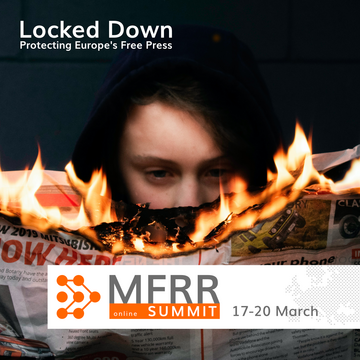
The MFRR monitors, tracks and responds to media freedom violations in EU Member States and Candidate Countries. In its first year, through Mapping Media Freedom, 378 alerts (with 1159 attacked persons or entities related to media) were documented in 29 out of 33 countries in the MFRR region. This demonstrates an urgent need to bring people from across the continent together to interrogate the threats to media freedom, from the COVID-19 pandemic to protest movements, state capture to vexatious lawsuits, and from online smear campaigns to police violence.
The keynote session on 17th March will be introduced by Věra Jourová, Vice-President for Values and Transparency in the EU Commission. The MFRR is also honoured to welcome Irene Khan, the UN Special Rapporteur on the Promotion and Protection of Freedom of Opinion and Expression to deliver the online keynote, offering a global picture of media freedom and what needs to change to protect journalists. This session will also premiere a short documentary featuring at-risk journalists, whistleblowers and media workers from across Europe, filmed during lockdown.
Leading journalists and experts will be joining the MFRR summit. They include Margo Smit, the News Ombudsman for Dutch public broadcasters; Piotr Pacewicz, the founder of OKO.Press (Poland); Tamara Filipovic Stevanovic, the Secretary General of the Independent Journalists’ Association of Serbia (Serbia); Stoyan Tonchev, the editor of Liberta.bg (Bulgaria); Veronika Munk, the co-editor-in-chief of Telex (Hungary); Besar Likmeta, the editor of BIRN Albania (Albania); Ameer Alhalbi, award-winning Syrian photojournalist (France) and Patricia Devlin, an at-risk Northern Irish journalist for Sunday World (UK). Each participant will bring their expertise and experiences from across Europe to the summit to help us understand what needs to change to ensure Europe’s press remains free.
Spread across eight panel discussions held online over four days, the summit will explore a wide range of important topics, including:
- The impact of COVID-19 on media freedom and the public’s right to know;
- The dangers of covering demonstrations and protests across Europe;
- The impact of police actions on media freedom;
- How states silence independent scrutiny through the capture of outlets and regulators;
- The wielding of SLAPPs to silence critical reporting by the wealthy, powerful and thin-skinned;
- Modifying the legal landscape to criminalise critical reporting, isolate journalists and target media freedom, and;
- Fighting the normalisation of online harassment and smear campaigns across Europe.
The summit will also feature a year in review for the MFRR partners to share their experiences from 2020. There will also be two participatory workshops to offer practical support as to how to become media freedom watch dogs through Mapping Media Freedom and address threats of online harassment.
The MFRR Summit is an opportunity to show solidarity with at-risk journalists, understand the media freedom environment across Europe and collaborate to identify ways we can protect journalists, media workers, whistleblowers and outlets and defend media freedom and the public’s right to know.
Media Inquiries
For interview and media requests please contact MFRR Coordinator, Nik Williams based at the European Centre for Press and Media Freedom on nik.williams@ecpmf.eu or +44(0)7955370992
Notes for Editors:
- To register and for more information: https://www.ecpmf.eu/mfrr-summit
- The conference will be delivered online via zoom and registration is free of charge.
- The official language of the conference will be English
This content is part of the Media Freedom Rapid Response (MFRR), a Europe-wide mechanism which tracks, monitors and responds to violations of press and media freedom in EU Member States and Candidate Countries. The project is co-funded by the European Commission.


